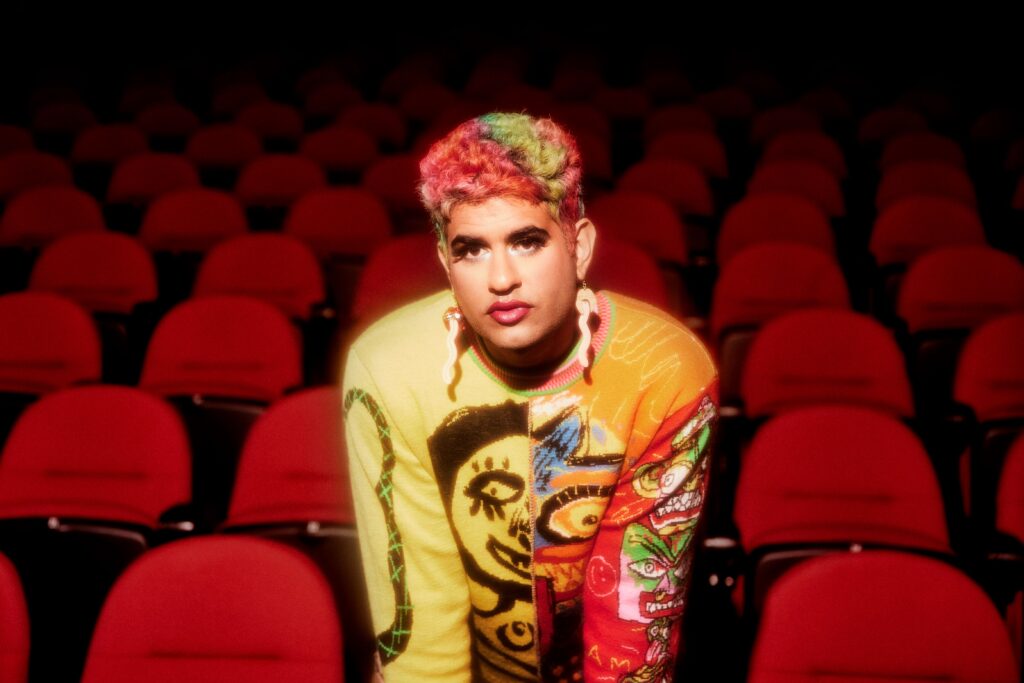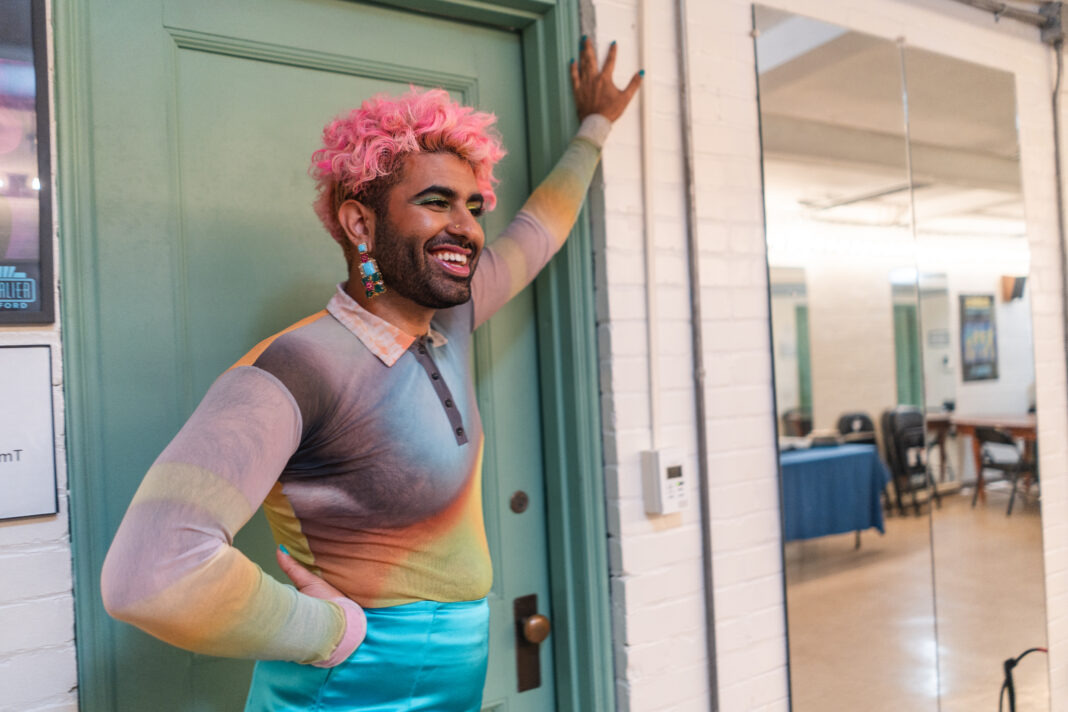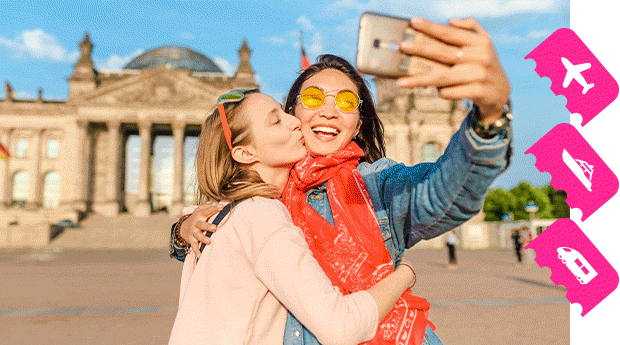“I think that we have to live our life incandescently and take our cues from nature, which is already writing the most exquisite poem. We’re just catching up to it,” ALOK told Jamie Lee Curtis in their interview on the World Beyond the Gender Binary at Upfront Summit earlier this year.
The gender non-conforming and transfeminine writer/performance-artist/disrupter is certainly following their own advice, spending the summer blazing through performances in Chile, Colombia, Brazil, Argentina, Peru, Mexico and Quebec. It’s noteworthy, perhaps, that they did so many gigs delivering their freestyle English-language set—an eclectic mixture of standup, TED Talk and lecture—to excited audiences who may not necessarily speak English as a first language. But ALOK, who was born in College Station, Texas, seems to be tapping into ideas and feelings that transcend language.
Museo Q, a Bogotá-based LGBTQ+ museum and art project “without walls,” helped Pink Ticket catch up with ALOK part-way through the tour. We interviewed them via email in late July, just after a sold-out show in Mexico City.
Where are you today? How did you get there?
In the physical sense I’m in Guadalajara, Mexico, on tour. I got here this morning from Mexico City, and I fly out tomorrow. In the spiritual sense: I am becoming. It’s less of a destination, more of an orientation. I’m trying to live the fullest and freest version of myself. How did I get here? Gruesome pain and incandescent joy. The best and the worst of times. In other words: being human.
I heard about your tour in Latin America through Museo Q. What’s it like being funny and insightful for Spanish-speaking audiences? What do you have to change about your performance when you’re in places with cultures quite different from your own?
In the past year I’ve performed my show in over 30 countries in five continents. I’m not going to say the “same” show because it always shifts in context: the moments where people laugh (and don’t), the particular words I use, how I move my body, the tone of my voice. I try not to conflate “country” with “culture,” because there are so many varied cultures within a country. Perhaps another way of saying that would be each show has its own culture: the city, the demographic of the crowd that night, the time of the show, the venue type, when in the calendar year. All of these things influence the shape of the show. I have to come on stage ready to adjust, pivot, innovate, ready to respond to the energy in the room.
What’s been special about this Latin American leg of the tour is that I’m noticing how I’m using my body and gestures differently to communicate the humour my words are trying to inaugurate. Like, okay, people might not understand this particular reference or turn of phrase, but how do I embody the sensibility of it? That’s been a lot of fun, to make the work three dimensional.
What did you love about Bogotá? What did you not like about it?
Bogota was one of my favourite cities I have ever been to. I really, truly had the time of my life. Museo Q did such an incredible job of making me feel at home: lots of discourse, lots of dancing. What I didn’t like about it was the harsh reality of violence that so many queers and human rights and land defenders have to face. There is so much wisdom, community, depth, tenderness, but it’s hard earned.
Do you enjoy touring?
It’s my ideal way to live. I’ve kind of been “on tour” for years. It’s a very hazy starting and ending point, it’s become a way of being for me. What keeps me here, on the road, is the profound sense of adventure, the miracle of strangers becoming friends, the way the Earth and its silly people teach me so many serious things. I like the concentration, the focus I have for each day and its tasks. I don’t get caught up on the past or the future, I’m present. Like, what’s on deck today? Also, I love collaborating with artists. Everywhere I go I get to work with the most stellar makeup artists, designers, performers. It’s thrilling. It makes me feel continually inspired.
What’s the worst thing about touring?
The sleep deprivation. I’m writing this to you at 3 a.m. after a show and I have to be up at 6:20 a.m. to head to the airport. The older I get the harder it is to maintain this schedule. It feels like a competitive sport.
Do you get recognized when you’re out in public and how do you usually handle it?
Yes. The people who approach me are most often incredibly sweet, respectful and wonderful people so it’s a delight.
Tell me about one—yes, I need you to pick one—of the favourite places you’ve visited on this tour.
My favourite place is usually the place I last was, and I’m not just saying that. So in this case: Mexico City. Wow. What a complicated, dynamic, expansive, case study in being. Walk around, get lost. Make a reservation at Masala y Maiz (Calle Marsella 72, Juárez, Cuauhtémoc, Mexico City), a restaurant, yes, but also a laboratory full of experiments on cross-pollination and hybridity. Delicious food with so much depth, intention and delight. A real gamechanger. Amnes!a (Jose Alvarado 6, Roma Norte, Cuauhtémoc, Mexico City) is a queer-owned vintage store with cool finds. Salón Silicón (Tehuantepec 223, Roma Sur, Cuauhtémoc, Mexico City) has moving queer art.
Tell me about a place that you expected to be one thing, but turned out to be something quite different.
I suppose that’s a working definition for travel, isn’t it? There are the stories we hear about places, and then we go to them and there’s usually rupture and dissonance from that story (in my experience, mostly in a good way). I was told that certain European countries were highly developed and found them to be highly emotionally repressed. That certain Global South countries were dangerous for queer people, and found them to have bountiful queer communities full of delight and care. One consistent thread is that everywhere I’ve been—even the places who get bad reputations for rudeness (cough, Paris)—there have been good, benevolent people who help me fall back in love with humanity. I focus on those: the best places to visit, conversations with new friends.
Tell me about a place you’ve visited that changed you as a person, and how it happened.
I caught on fire in 2012 in Cape Town, South Africa, and I still have the burn scars to prove it. That summer I had limited mobility as I recovered, so I was forced to sit down and write. And write I did. I took poetry more seriously than ever. And those poems, they gave me permission and conviction to say out loud, “I want to be an artist,” and eventually “I am an artist.” And here I am now. Every time I return to Cape Town (I was just there last year), I say thank you to the land for helping to give birth to my me.
What’s a place you’ve dreamed of visiting but haven’t been yet? What’s the allure?
I really want to go to Japan. For years I’ve followed Japanese street fashion and it would be so special to experience it in person. Hopefully soon.
What’s your philosophy around packing?
Let’s establish this from the get-go: baggage weight restrictions are homophobic! Pack three heels and you already reach the limit. Absurd.
Now that we’ve got that out of the way: I’ve learned to pack half a suitcase, because I’m inevitably going to shop on my trip and will need more room. I pack like I write a draft of something. There’s the first round, then I go through edits until I clear enough space for what’s yet to come.
When you visit a new place, do you have any rituals or strategies to get yourself set up and oriented?
I go where the queers congregate and without fail that sets me in the right direction.

What’s the biggest challenge for you when travelling as a gender non-conforming person? Are there perks?
Navigating transportation security is stressful: the pat downs, the gendering, the interrogations about what’s in my bag and why. Eek!
The perks? So many. Once I had a conversation with a straight cis male friend and he was like “I’m so jealous that everywhere you go you meet the best people and when I travel I don’t know how to meet locals.” Being gender non-conforming means that I’m able to find other people like me and have an immediate sense of connection with community, and therefore a deeper connection with place. It’s become so second-nature to me I hadn’t realized that’s a perk.
What advice would you give to other gender non-conforming travellers?
No itinerary is complete without considering safety. Safety planning is part of trip planning. Research the places that you’re going, plan ahead. What kind of transportation will you be taking? Who are your emergency contacts? Who should you be sharing your location with? What are the current laws in place? Etc. Etc.
What’s one thing you won’t travel without?
My neck pillow.
This interview has been edited for length and clarity.


